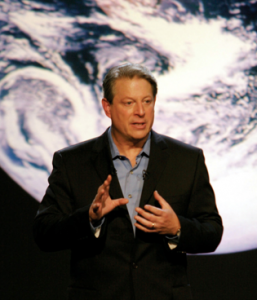
I read a few interesting climate change pieces over the weekend. Taken together, they reflect the political struggle to pass comprehensive clean energy and climate legislation now. But only one captures what is at stake for America and our future: Al Gore’ New York Times op-ed.
Gore’s piece was refreshingly straightforward. He didn’t hide from the attacks on climate science. He addressed head-on the critics of the IPCC reports, reminding us that two mistakes in a 2,880 page-report do not undermine the overwhelming scientific consensus on climate change.
He also used hard data to refute misguided claims that heavy snowstorms in the Northeast must mean climate scientists are wrong. Instead, he reminded us that global warming is a global phenomenon and that even though it has been a cold winter here in the United States, it was the second-hottest January on record since surface temperature were first recorded 130 years ago.
Gore is good at revealing the bigger picture. He reminds us that confronting climate change is not about partisan politics. It is about enhancing national security, creating jobs for American workers, and making America competitive in the growing economic sphere of clean energy.
Most importantly, it is about American leadership. The United States must step forward to address this planetary and human tragedy. The world is waiting for us.
Al Gore certainly demonstrates bold leadership. He has urged us all to demand climate action for years, and his case is more powerful than ever. I applaud him once again.
I also applaud Senators Kerry, Graham, and Lieberman, whose bipartisan framework for solving climate change Gore praises. These leaders have not veered from the job at hand even in the face of partisan gridlock in Washington and attacks in the press and blogosphere.
The Washington Post ran an article on Saturday outlining some of the current battles over clean energy and climate legislation in the Senate. It even asserted that the cap and trade approach to limiting global warming pollution may be jettisoned from the bill.
Tom Friedman’s piece in the Sunday New York Times gave Senator Graham a fuller opportunity to explain the issue: “cap-and-trade as we know it is dead, but the issue of cleaning up the air and energy independence should not die—and you will never have energy independence without pricing carbon. The technology doesn’t make sense until you price carbon.”
I can’t say for certain which measures will be included when Senators Kerry, Graham, and Lieberman’s unveil their final legislative proposal later this week. But I can say I endorse their fundamental goals: helping set our country on a path a clean energy future that will create jobs, make our country more secure, and reduce carbon pollution.
Regardless of the Post’s reports about Congressional bickering, I know what it will take to achieve these goals. Sound legislation must include:
- A steady, mandatory reduction in emissions from our largest sources of global warming pollution. This approach provides utilities and corporations with the predictability they need to make long-range investments. It also gives them the time to develop the most cost-effective strategies for cutting carbon pollution.
- Measures to promote the clean energy technologies we need to put Americans back to work, make our economy more efficient, improve U.S. competitiveness in the global marketplace and reduce our reliance on foreign oil.
I light of the challenges—and opportunities—that Gore detailed in his op-ed, I am encouraged by the important work Senators Graham, Kerry, and Lieberman are doing, and we look forward to working closely with them—and other Senators from both sides of the aisle—to help pass a strong climate, jobs, and clean energy bill.
As Gore reminded us, this is a moment for leadership, not bickering.
This post originally appeared on NRDC's Switchboard.
Frances Beinecke is President of Natural Resources Defense Council in New York. She started with NRDC in 1973 with a background in environmental studies and did extensive work to preserve forests. Eventually, she became executive director and then president in 2006. NRDC is a non-profit organization dedicated to protecting the environment, people and animals. NRDC was founded in 1970 and is comprised of more than 300 lawyers, scientists and policy experts, with more than one million members and e-activists.

